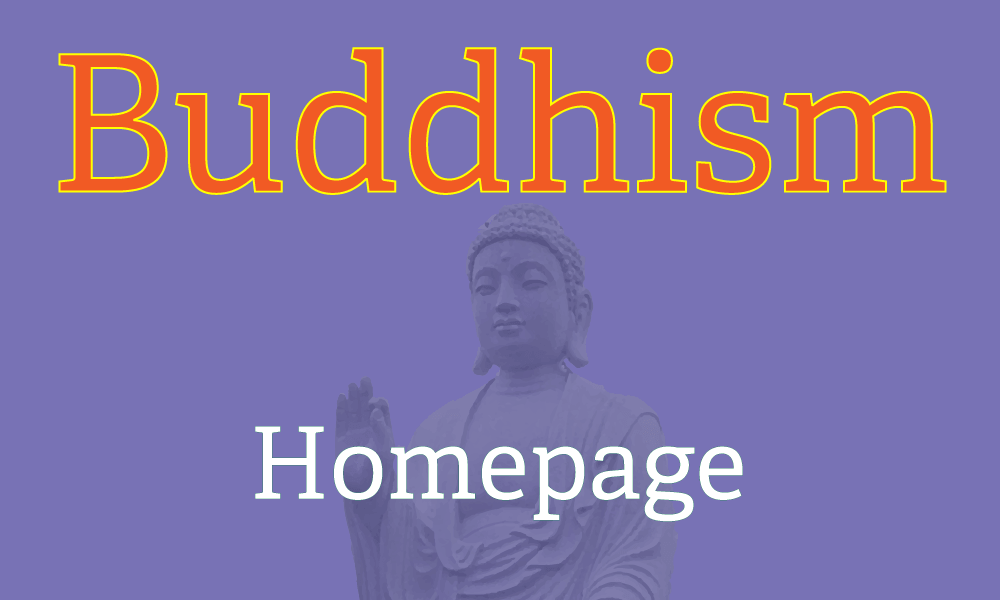

Hinduwebsite.com - Buddhism Home Page
Buddhism originated in India, but inspired the world
for centuries before the great decline happened, which the Buddha himself
predicted during his lifetime as the inevitable consequence of all things
that are impermanent. It is debatable how far the Buddha deviated from the
tenets of Vedic religion which his parents practiced. However, it is true
that his leadership and organizational skills and the dedication of his
early disciples played a significant role in the formation and progress
of Buddhism in ancient India as a distinct tradition.
Buddhism differs
from Brahmanism mainly with regard to the nature of soul and creation, but
in several other aspects concurs with its doctrines such as karma, rebirth,
self-purification, liberation, and renunciation. It is mainly an ascetic
or renunciant tradition with few provisions for the lay followers to prepare
for monastic life through successive stages of mental preparation and detachment.
Buddhism is very much relevant today as it was two thousand years
ago. The practice of Buddhism provides insightful solutions to the vexing
problems of humanity such as violence, stress and suffering. Buddhism is
essentially a religion of the mind rather than the spirit. It is grounded
in reality, and its practices and solutions are verifiable and repeatable.
The Buddha taught the world the best way to realize the Four Noble Truths
through meditation and mindfulness techniques and by following the painless
Eightfold Path. In this section on Buddhism, we bring to you comprehensive
information on Buddhism, Buddhist philosophy and practice based upon the
techniques and teachings of the Buddha himself. Both advanced practitioners
and lay followers of Buddhism can benefit from the information provided
here on various aspects of Buddhism and its main beliefs and practices
Buddhist
Philosophy
Find
here essays on the philosophy of Buddhism, Buddha's
teachings and sermons about the Four Noble Truths,
the Eightfold path, important Buddhist concepts such
as Anatta and Anicca, and the Buddhist way of life.
Buddha's Life
The
Buddha found a very practical and direct approach to
resolve the problem of suffering. This section contains
information about the life, activities, and teachings
of the Buddha from his early days to his last days.
Monastic Life
Buddhism
is essentially an ascetic religion. The Buddha organized
the monks into groups so that they could stay together
and learn from each other. This section contains information
on the Dhamma and Vinaya, the discipline, rules and
code of conduct applicable to monks as well as lay Buddhists.
Buddhism History
This
section is about the origin, rise and spread of Buddhism
in India as well as in the world, the life and teachings
of the Buddha, biographical accounts of important disciples
of the Buddha, status of Buddhist nuns, Buddhist councils,
history of Buddhist sects, and Buddhist chronologies.
Buddhist Concepts
This
section contains information on the concepts of Buddhism
such as anatta or no-self, anicca or impermanence, the
stand of Buddhism on God, suffering, transmigration
of souls, karma, avijja or ignorance and so on. Also
included in the list is a link to the glossary of Buddhist
terms. .
Buddhism Practice
Find
here informative essays, study guides and practical
advice on the practice of Buddhist Dhamma, commonly
known as Vinaya to be practiced on the Eightfold Path
by both lay Buddhists and monks, and cultivation of
virtues and ethical discipline to resolve rebirth and
attain Nirvana..
Essays on Buddhism
We have
included here several essays on the essential beliefs,
practices, history, philosophy, techniques and literature
of Buddhism, with special emphasis upon the life and
teachings of the Buddha, the Four Noble Truths, the
Eightfold Path, etc.
Schools of Buddhism
In its
long history, Buddhism suffered from many schisms. This
section helps you know the growth and development of
important Buddhist schools such as Chinese Buddhism,
Mahayana Buddhism, Theravada Buddhism, and Tibetan Buddhism.
Meditation Techniques
Know
from here objects and subjects of meditation, how to
cultivate right attentiveness and right concentration,
basic breathing techniques, how to spread good will,
understanding the no-self concept, contemplation of
death, and more. .
Dhamma Teachings
Dhamma
is the heart of Buddhism. Know from here the significance
of the Four Noble Truths, the Eightfold Path, the Middle
Way, the principles of right living, how to achieve
Nirvana, and more.
Hinduism and Buddhism
Both
Hinduism and Buddhism originated in India and coexisted
together for a long time. This essay provides a very
comprehensive comparative and contrasting account of
Hinduism and Buddhism.
Buddhist Texts
We have
brought to you in this section English translations
of several important Buddhist texts, guides, travel
accounts, lectures, dhamma talks, history, biographies,
Buddhist schools, Zen Buddhism, Sutra literature, etc.
.
Books on Buddhism
Our list
of books on Buddhism include selected titles on Buddhist
philosophy, history, Buddhist schools, life of the Buddha,
Buddhist monasteries, meditation practices, literature,
and related information.
Buddhism Resources
Included
here are external links to various aspects of Buddhism,
such as the Buddhist Art, Buddhism in the West, ethics
and morals, criticism, Buddhist psychology, publications,
study guides, and schools.
Hindu Budhist Meditation
Although
Hinduism and Buddhism originated in the Indian subcontinent
both are different belief systems, with some similarities.
In this essay, we examine the divergent approaches followed
in Hinduism and Buddhism with regard to their meditation
and contemplative practices to achieve liberation.
Buddhism and Jainism
At one
time, during the early Christian era, Buddhism and Jainism
attracted widespread following in different parts of
India and posed a major challenge to Hinduism. In this
essay, we point out the differences and similarities
between the two, and why the Buddha preferred the Middle
Path rather than an extreme ascetic path.